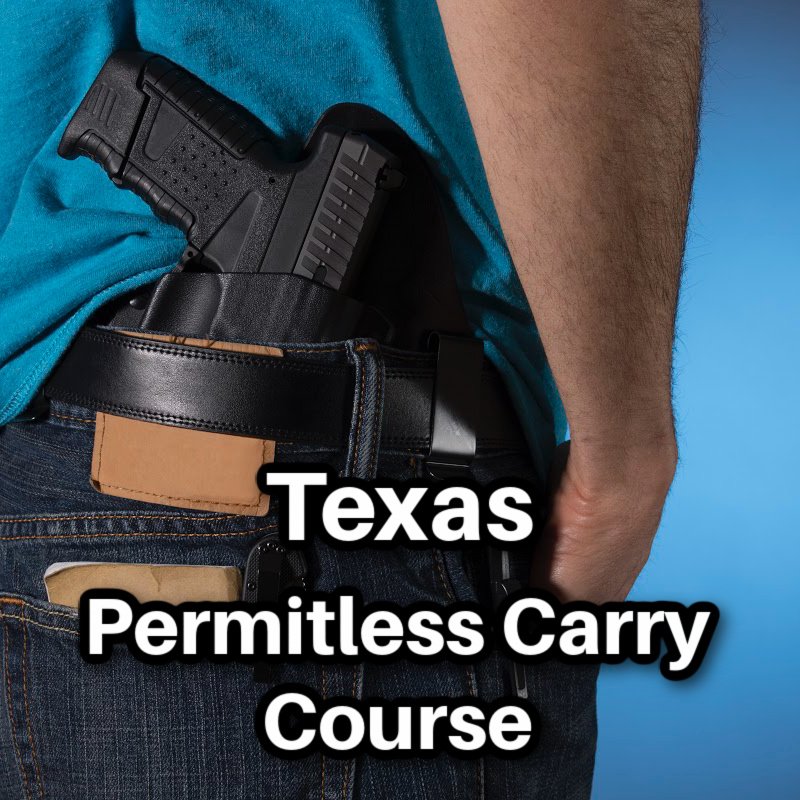
Online Constitutional Carry Class
$ 25
This course will teach you everything you need to know to carry in Texas without a license. Learn all the laws, restrictions and regulations that come with carrying without a license so you can carry with peace of mind.
- Permitless Carry Class Texas HB 1927, which is the permitless carry bill for Texas, has passed the Texas House, the Texas Senate and has been signed by Governor Abbott. Going into effect on September 1st, 2021, Texas will become the 21st state to pass some form of constitutional carry in the United States.
- Learn basic laws, restrictions and regulations.
- Texas License to Carry Online Class is still available, for a little more time and money get the TLC/CHL
18–20-year-olds can now get a Concealed Carry in Texas. The new age requirement for the Texas License to Carry – Texas Concealed Carry is now only 18 years old per Federal Court Ruling.
Firearms Policy Coalition, Inc. et. al., v. Steven McCraw, et. al., No. 4:21-cv-1245-P
On September 1, 2021, Texas became the 21st state in the United States to implement Constitutional Carry. Constitutional Carry is a law that allows individuals to carry a firearm without a permit or license, as long as they are legally allowed to possess a firearm. The law has been a contentious issue in Texas for many years, with advocates arguing that it is a necessary protection of the Second Amendment, while opponents argue that it is a threat to public safety. In this article, we will explore the history of Constitutional Carry in Texas, its implementation, and its potential impact on the state.
History of Constitutional Carry in Texas
The debate over Constitutional Carry in Texas began in the early 2000s, with several unsuccessful attempts to pass the law in the state legislature. In 2015, the Texas Legislature passed open carry legislation, which allowed individuals to openly carry firearms in public places. This legislation was seen as a victory by gun rights advocates, but many argued that it did not go far enough. In 2017, the Texas Legislature passed a bill that would have allowed individuals to carry a concealed firearm without a permit, but the bill was vetoed by then-Governor Greg Abbott.
In 2021, however, the Texas Legislature finally passed a Constitutional Carry bill. The bill, which was signed into law by Governor Abbott on June 16, 2021, allows individuals over the age of 21 who are legally allowed to possess a firearm to carry a handgun without a permit or license. The law also allows Texans to carry a firearm in their vehicles without a permit, as long as the firearm is not visible.
Implementation of Constitutional Carry
Constitutional Carry went into effect on September 1, 2021. Since the law went into effect, Texans have been able to carry a handgun without a permit or license, as long as they are legally allowed to possess a firearm. However, there are still restrictions on where individuals can carry firearms. For example, firearms are not allowed in certain locations such as schools, polling places, and government buildings. Private businesses are also allowed to prohibit firearms on their property.
Potential Impact of Constitutional Carry
The implementation of Constitutional Carry in Texas has been met with both praise and criticism. Supporters of the law argue that it is a necessary protection of the Second Amendment and a step towards a more free and independent society. They argue that the law will make it easier for law-abiding citizens to defend themselves and their families in the event of a violent attack. Supporters also argue that the law will remove unnecessary barriers to gun ownership and make it easier for individuals to exercise their constitutional rights.
Opponents of Constitutional Carry, on the other hand, argue that the law is a threat to public safety. They argue that allowing individuals to carry firearms without a permit or license will lead to an increase in gun violence and accidents. Opponents also argue that the law will make it harder for law enforcement to identify individuals who are carrying firearms illegally.
It is important to note, however, that the implementation of Constitutional Carry in other states has not led to an increase in gun violence. In fact, many states that have implemented Constitutional Carry have seen a decrease in crime. According to the Crime Prevention Research Center, states that have implemented Constitutional Carry have seen a 13% lower homicide rate compared to the rest of the country.
In addition, supporters of Constitutional Carry argue that the law will not only protect law-abiding citizens but will also deter criminals. They argue that criminals are less likely to commit crimes when they know that their potential victims may be armed. According to a survey conducted by the Pew Research Center, 57% of gun owners say that owning a gun makes them feel safer.











